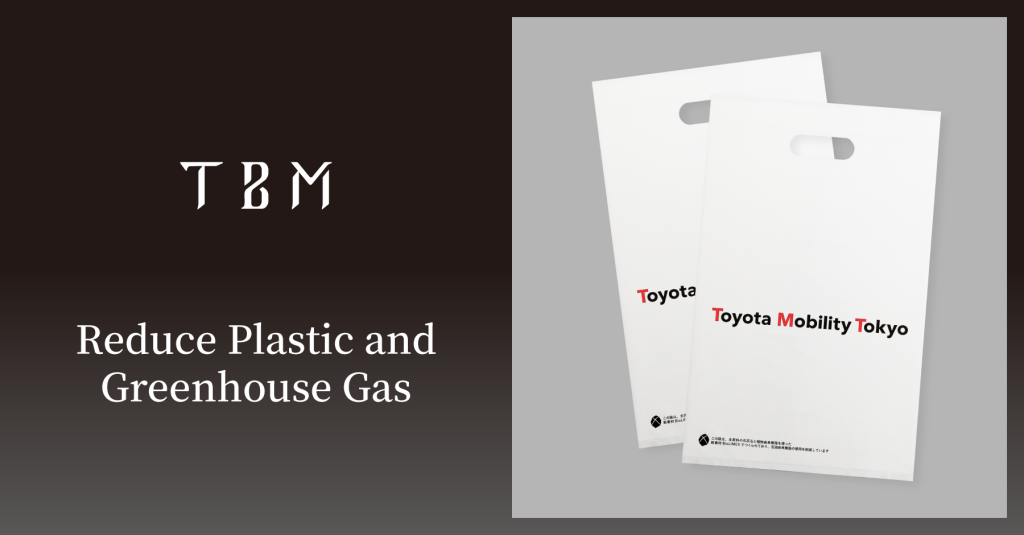Press release
- LIMEX
TBM, "Bio LIMEX Bag" using limestone and plant-derived resin adopted for handbags in Toyota Mobility Tokyo
- Reduces petroleum-based plastics and CO2 emissions, contributing to efforts to reduce environmental impact -

TBM Co., Ltd. (Head office: Chiyoda-ku, Tokyo; Representative Director and CEO: Nobuyoshi Yamasaki; hereinafter referred to as TBM) is pleased to announce that its environmentally friendly "Bio LIMEX Bag," made primarily from limestone and plant-derived resin, has been adopted for the carrier bags at Toyota Mobility Tokyo Co., Ltd. (a Toyota dealership wholly owned by Toyota Motor Corporation; Head office: Minato-ku, Tokyo; President and CEO: Seiichi Sekijima; hereinafter referred to as Toyota Mobility Tokyo) Toyota brand stores.
By replacing conventional carrier bags, which use 10% plant-based resin, with Bio LIMEX Bags, it is expected that the amount of petroleum-based plastics used can be reduced by approximately 85% annually, and greenhouse gas emissions can be reduced by approximately 29%. *1 The Bio LIMEX Bag has received high praise both at home and abroad, winning the Good Design Award's "Good Design Best 100" in 2020 and being selected as one of the TOP 100 in the "Design Intelligence Award 2021," one of China's leading international design awards, in 2021.
In the future, TBM will promote the introduction of Bio LIMEX Bags, LIMEX Pellet, which can be processed using Decarbonization molding, blown-film molding, vacuum forming, etc., and LIMEX Sheet, which can be used for catalogs, clear files, etc., in the automotive industry, where decarbonization efforts are accelerating.
*1 Based on LCA (2020) by TBM Co., Ltd. (from raw material procurement to disposal | comparison by weight) | May vary depending on manufacturing conditions
LIMEX Bag details: https://tb-m.com/limex/products/limexbag
2020 GOOD DESIGN BEST 100: https://www.g-mark.org/award/describe/50148
Design Intelligence Award 2021: https://en.di-award.org/collections/detail/1207.html
Background
Companies are being asked to take action to achieve the Sustainable Development Goals (SDGs) and solve the problem of plastic waste. There is a growing movement overseas to regulate single-use plastics, with over 127 countries *2 already restricting the use of grocery bag, and the European Union (EU) has passed a bill banning single-use plastics. In Japan, the Ministry of Economy, Trade and Industry has mandated a mandatory grocery bag fee from July 2020 as part of a strategy to comprehensively promote plastic material circulation.
Some Toyota Mobility Tokyo stores have adopted a Building Energy Management System (BEMS) that combines solar power generation, storage batteries, LED lighting, energy-efficient air conditioning, and other technologies to optimally control the storage and discharge of electricity to reduce power consumption. Furthermore, in order to popularize plug-in hybrids, the store is also taking environmentally friendly measures, such as equipping its stores with charging stations. As part of its efforts to reduce CO2 emissions and conserve resources, the store was considering switching to a different material for its carrier bags, and decided to adopt Bio LIMEX Bags, after their environmental performance was recognized.
*2 United Nations Environment Programme (2018). Legal Limits on Single-Use Plastics and Microplastics: A Global Review of National Laws and Regulations
